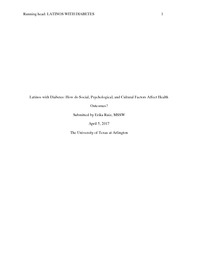| dc.description.abstract | Diabetes has become one of the most common, costly, and preventable health problems diagnosed among all Americans (Centers for Disease Control [CDC], 2015a). Twenty-nine million individuals (9.3% of the population) have diabetes; this figure includes both diagnosed and undiagnosed diabetes cases (American Diabetes Association, 2014a,b). Diabetes is highly prevalent among Latinos in the United States; it is the fifth leading cause of death among this population (National Center for Health Statistics, 2011a). Yet, most people with diabetes do not die from diabetes per se; most people with diabetes die from cardiovascular disease. Given the large number of Latinos in the United States (i.e., 56.6 million) (United States Census Bureau, 2016), and the shift in migration patterns of Latinos to places other than the south (Krogstad, Passel, & Cohn, 2016), social workers will need to provide culturally competent services to heterogeneous Latino subgroups whose health beliefs, values, and practices may be different from their own.
The purpose of this study is to assess how socioeconomic, psychological, and cultural factors affect cardiovascular disease risk among Latinos with diabetes. The present study was guided by the following questions: what are the experiences of Latinos in accessing and utilizing health services and treatment?; how do Latino subgroups’ experiences with diabetes complications differ when considering biological, psychological and cultural factors?; what are the risk and protective factors that reduce or increase access to health care for people with diabetes?; and what are the risk and protective factors that reduce or increase the risk of cardiovascular disease risk for people with diabetes?.
The following theory, health behavior model, and frame work of preventive strategies were used to identify psychosocial factors that protect or increase Latinos’ risk to diabetes and cardiovascular disease: the Ecological Systems Theory, Andersen’s Health Behavior Model of Health Service Use, and Haddon and Baker’s framework of preventative strategies. A cross-sectional design, utilizing data from the 2014 Integrative Health Interview Series (IHIS), was used (Minnesota Population Center and State Health Access Data Assistance Center, 2015). There were 24,909 individuals who have self-identified as Latinos in the 2014 IHIS data set; however, only participants who self-identified as an individual with diabetes were selected from the data set.
Aspects that are considered important in accessing health care include: having a usual source of care; not having a delay in care; being able to afford health care services and medications; not being worried about affording medication and health bills; being able to find health care provider and services; and having and being able to afford health insurance coverage (Office of Disease Prevention and Health Promotion, 2014; U.S. Department of Health & Human Services, Agency for Healthcare Research and Quality, Rodriguez, 2011). Most participants in this study had a usual source of care and were covered by health insurance; thus, very few experienced delay in accessing health care services, nor were they worried about affording medication and health bills. Differences were found when Latinos were compared on numerous psychosocial factors (i.e., education, psychological distress, access to health care, physical activity, body mass index, self-rated health, internet based health literacy, and cardiovascular disease risk) based on citizenship status, length of residence, language of interview, and Latino background. Furthermore, five salient factors were identified as direct factors associated with cardiovascular disease risk among Latinos with diabetes: age, sex, psychological distress, physical activity, and acculturation.
Furman, Negi, Iwamoto, Rowan, Shukraft, and Gragg (2009) provide a review of issues that social workers working with Latinos should be aware of, and recommend that social workers keep up with the current Latino literature. Findings from this study provided numerous implications and recommendations with a concentration on research, policy, and practice. In terms of research, there appears to be a serious need to a) advocate for the increased representation of Latinos from diverse countries of origin; b) the need of improved measures of acculturation; c) the need to assess the Latino health paradox for each Latino subgroups; d) standardization of data collected on Latino population; and e) propose that data on genetic and racial differences be included in epidemiological studies (Rodriguez et al., 2014). As for policy, the researcher identified policies that directly and indirectly affect Latinos access to health care, and provided recommendations to improve Latinos’ access to health and mental health care. In regards to practice, the results suggest that social workers and related providers in health care settings should take into consideration a beneficial recommendation by Rodriguez el al. (2014) encouraging initiatives that: a) increase access to health care and offer assistance to help with the financial burden of attributed to diabetes and cardiovascular disease treatment; b) encourage diabetes and cardiovascular disease risk knowledge; and c) promote health behaviors that reduce the risk of diabetes and cardiovascular disease risk. | |


